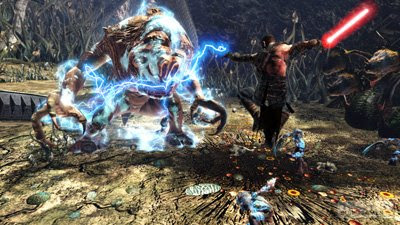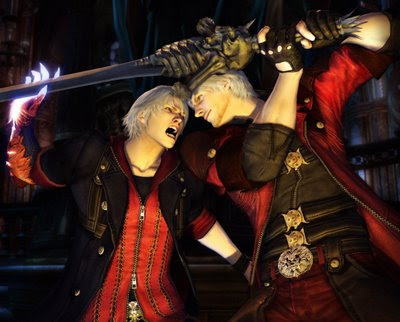
Lucasarts have certainly set themselves a high bar with The Force Unleashed. Combining cutting-edge videogame tech with a heavily scripted, canon-approved script, the game is the highest profile Star Wars release in years, and is tied into a larger campaign of toys, novels and comics just as Lucasarts did with Shadows Of the Empire many years ago. At the heart of this however, lies the game itself. There've been too many Star Wars games that have been all hype and no substance. Can The Force Unleashed rise above this impression?
It certainly makes a good first showing. Visually, you've never seen the Star Wars universe like this before. Everything is beautifully lit and immaculately textured, and the environments immediately feel right. Old stuff is painstakingly recreated, new stuff is carefully designed and fits in well. It's a good job that the game looks so beautiful too, because a major portion of the gameplay involves smashing up and tearing down this remarkable vision. Much has been made of The Force Unleashed's revolutionary technology, in particular the Digital Molecular Matter tech which causes the environment to deform in realistic ways. I couldn't begin to tell you how it works, all I know is that it does, and it looks astonishing. Metal bends, glass shatters, wood splinters and all hell breaks loose as the environment is radically altered with extreme force. Nowhere is this better demonstrated than in the game's bravura prologue, in which you take control of none other than Darth Vader himself. Tasked with clearing out a Wookiee village, and armed with your lightsaber and a full complement of turbo-charged force powers, incredibly fun havoc ensue. The entire level is an onslaught of satisfying destruction, throwing massive boulders through treehouses or blasting down enormous barricades. The opening highlights everything that is great about Force Unleashed, the impressive visuals, the visceral gameplay, the outstanding environments and the overall 'Star-Warsiness' of the experience combining to deliver a showcase of gaming at its very best. Sadly, it's sort of downhill from there.

This is what we like to see
The first problem occurs when the game proper begins and you take control of the main protagonist, Darth Vader's secret apprentice Starkiller. Running into the first room, you get ready to let slip your astonishing force powers, only to discover that most of them have gone. It's not so much the Force unleashed as the force mildly contained, and l
leads to a huge overreliance on throwing boxes around, making the game feel like a lightly more polished version of Psi-Ops. You can also attack with your lightsaber, but again, you've got practically no combos at this point, so it descends into mindless button-mashing. The idea of a 'look what's possible' teaser is good in concept, but translates to a letdown in reality. The idea of stripping you of your powers is to implement an RPG style 'level up and choose your talents' progression, which again is interesting in theory but redundant in reality, since the game itself will only dole out new powers at certain points and some upgrades are noticeably more useful than others.
Combined with the lack of power is the creeping feel of uninspired level design. Though immaculately detailed, level design tends towards the repetitive, often falling into the dreaded 'series of rooms and corridors'. The large number of level set in starships/space stations/industrial facilities doesn't help either. Furthermore, realising that your powers make you nearly unstoppable in small scale skirmishes, the developers have chosen to instead throw dozens of enemies at you at once in huge battle chambers, often reducing the situation to a 'kill everything to get out' model. Though this is rarely difficult (in fact the game generally is slightly on the easy side) it can be hugely frustrating, particularly when later enemies either resist your powers or can keep you a long way away with uncannily accurate projectiles. Combat is particularly wearisome during boss battles, where the camera inexplicably assumes a locked perspective that is rarely ideal. Nowhere are the failures in design highlighted batter than the infamous sequence where Starkiller pulls a Star Destroyer out of the sky. What should have been the game's defining moment instead becomes an exercise in frustration as you're constantly interrupted from the spectacle by irksome enemies.

For a junkyard, the world of Raxus Prime is astonishingly atmospheric
Despite all the griping however, there is a very fine game within. Although the environments can often be uninspired, they are never less than beautiful. The junk planet of Raxus Prime is a superb example of how to do an apocalyptic wasteland right, its mustard sky and rusted landscape an oddly beautiful setting. And once you crank your force powers up a few notches, the game regains some of its blood and thunder and becomes massive fun to play. Throwing screaming stormtroopers into an abyss or blasting rancors with force lightning is a pleasure every time, and the terrific feedback that the game world gives never gets old. There's a few big surprises as well, the first being how replayable the game is. Your powers and abilities carry over to a new game, so you can monster the early levels with maxed out force powers, and while the game is totally linear, the unpredictable nature of the battles mean that every new fight is fresh. Hidden holocrons unlock goodies such as new costumes and lightsabers, giving an item hunt aspect to old levels.
The other big surprise is the story, which is deep, interesting and surprisingly relevant to the rest of the Star Wars universe. It's fair to say that what happens in the game adds a significant dimension to the events of the original trilogy. Bar the predictable and predictably rubbish love story, the narrative is strong and the voice acting excellent. There's old faces aplenty (including one gleefully out of place cameo) and a few great new characters. Special mention goes to PROXY, the Apprentice's loyal droid sidekick who has been programmed to try and kill him at every available opportunity.
In summary then, it's a missed opportunity, a flawed gem. The game reminds me a lot of Assassin's Creed - technically superb, and with moments of genius, but ultimately held back from greatness by failure on some of the most basic levels. There's no excusing some of the poor design in Force Unleashed, nor the frustration and repetition involved therein. Equally, there's no denying how fun it is at it's very best. The deep and through integration of the Star Wars universe earns it an extra point from me, but at the end of the day this is an entertaining toy rather than the new dawn we were hoping for.
[7]






